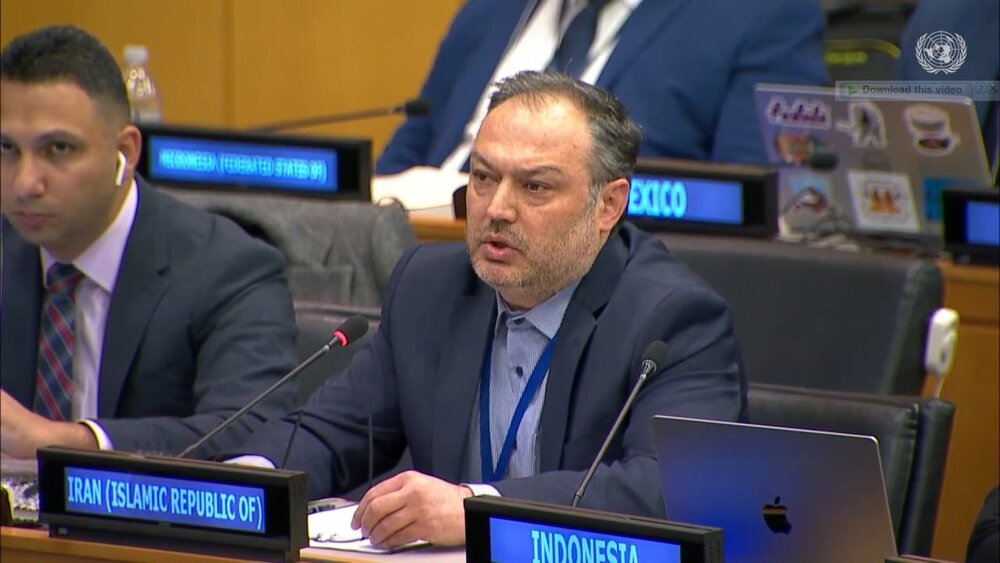Iran ready to cooperate with UN, regional countries to tackle SDSs

TEHRAN – Iran is ready to cooperate with regional countries and the United Nations to minimize the effects of sand and dust storms (SDSs), a member of the Permanent Representative of Iran to the United Nations has said.
Ali Hajilari made the remarks at the first official meeting of the Second Committee of the 77th session of the United Nations General Assembly.
In order to deal with the threats caused by desertification, drought, as well as the harmful effects of dust storms, he emphasized the need for using the capacity of the United Nations coalition to deal with the phenomena.
One of the most important challenges in our country and many other countries in the region is the issue of sand and dust storms, known as SDS, and according to numerous reports of the United Nations and its specialized agencies, more than two-thirds of the countries in the world are somehow dealing with this environmental challenge, he noted.
He went on to say that the share of this problem is more in our region and more complicated due to the intertwining of problems caused by drought, desertification, unbalanced development plans, and many other factors. Nevertheless, such an important challenge with its vast dimensions has been in the blind spot of the international community and is often treated as a regional or local concern.
Unfortunately, Iran faces the most intense sand and dust storms during the dry season. A comprehensive national plan has been created to deal with the threats caused by desertification and drought, as well as the harmful effects of dust storms, and this is exactly where the entire UN development system should come to the aid of countries like Iran so that the consequences of such storms can be minimized, he highlighted.
He further announced readiness to cooperate with all the countries of the region and the United Nations to deal with dust storms.
The Islamic Republic considers the condemnation and immediate cessation of coercive measures and illegal unilateral sanctions as a necessary condition for the realization of real sustainable development, he emphasized.
The Islamic Republic believes that the UN development system should be effective and transparent so that it can play its role in supporting countries in achieving development and overcoming the challenges they face, he noted.
---------SDS effects
The SDSs phenomenon has been plaguing the country for several years and has caused problems in many provinces. According to experts, natural and human factors are involved in the occurrence and severity of this phenomenon which is mainly caused by excessive consumption of water and drying up reservoirs.
The internal dust sources are estimated at 34.6 million hectares, generating an average amount of 4.22 million tons of dust per year, about 1.460 million hectares are dried wetlands.
Some 4.23 million tons of dust are raised per year, which means the loss of soil fertility will hit the agricultural sector.
All the SDSs sources are not located in Iran, 300 million hectares in the neighboring countries are giving rise to SDSs, which transport dust into Iran. The total dust density is estimated at about 150 million tons.
In fact, the dust is raised from Turkmenistan, Uzbekistan, Afghanistan, and Pakistan in the northeast as well as Iraq, Syria, Saudi Arabia, and Jordan in the south, southwest, and west.
Letizia Rossano, the director of the Asian and Pacific Centre for the Development of Disaster Information Management (APDIM), said in June that Iran is really at forefront of understanding the problem of sand and dust storms as well as dealing with it.
More than 80 percent of the entire populations of Turkmenistan, Pakistan, Uzbekistan, Tajikistan, and the Islamic Republic of Iran are exposed to medium and high levels of poor air quality due to sand and dust storms," she noted.
A 10-year plan has been prepared to mitigate internal hotspots giving rise to sand and dust storms (SDSs), Ali Salajeqeh, head of the Department of Environment (DOE), has announced.
Based on the 10-year plan, the relevant institutions are performing their tasks to curb SDS effects, he stated, adding that the Natural Resources and Watershed Management Organization should have the first role in the plan, and the Planning and Budget Organization should also stand by the work.
FB/MG
Leave a Comment